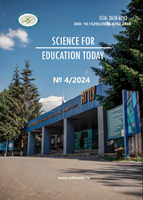Оценка эффективности развития финансовой культуры будущих преподавателей экономических дисциплин
Evaluating the effectiveness of developing financial culture of future economics teachers
Author(s): Natalia E. Khabibova, Daria S. Vasilina, Leylya N. BayanovaSubject(s): Economic history, Higher Education , Economic development, Socio-Economic Research, Sociology of Education
Published by: Новосибирский государственный педагогический университет
Keywords: Financial culture; Financial literacy; Financial module; Professional competencies; Modern educational technologies; Initial teacher education; Financial knowledge; Financial behavior; Financial attitudes;
Summary/Abstract: Introduction. The article is devoted to initial teacher education for future Economics teachers with the focus on developing their financial culture, which contributes to effective interaction with society in various financial situations as well as to successful professional self-identification (increasing interest in obtaining professional knowledge, skills and abilities), and gaining experience in selforganization. The purpose of the study is to evaluate the effectiveness of the process of developing financial culture in future Economics teachers (theoretically and experimentally). Materials and Methods. The study was conducted as part of a pedagogical experiment. Evaluating the effectiveness of developing financial culture was based on the Strategy of improving financial Literacy and the formation of financial culture until 2030, International and Russian studies commissioned by the Bank of Russia, as well as the educational experience of training future Economics teachers. The analysis and generalization of the data obtained within the experimental work were carried out. The sample consisted of 102 undergraduate students studying the field of Vocational Education (43.04.03) and majoring in Economics and Management. The validity of the results obtained is confirmed by the International PISA-2018 research and the analysis of the Institute of the Public Opinion Foundation. Results. The analysis of scholarly and educational literature enabled the authors to clarify the concept of ‘financial culture’, to determine its nature and place in society. Therefore, we specify financial culture as the most important factor in the development of national sustainability. As part of the experimental work, the authors evaluated the effectiveness of developing financial culture in future Economics teachers. The research within the framework of the formative stage of the experiment showed a positive trend in the development of students’ financial culture. It was revealed that in order to develop students’ financial culture efficiently, it is necessary to adhere to certain conditions: pay great attention to the financial module, hold events within student associations, use the entire arsenal of modern educational techniques and procedures, systematically analyze the dynamics of the development of students’ financial culture, rely on official data from research centers in Russia and other countries. Conclusions. The results of the study prove that educational conditions justified and implemented in pedagogical universities ensure the effectiveness of developing financial literacy in future Economics teachers. The authors conclude that the development of financial culture can be considered to be the most important condition for students’ successful professional development.
Journal: Science for Education Today
- Issue Year: 14/2024
- Issue No: 4
- Page Range: 117-141
- Page Count: 25
- Language: Russian

